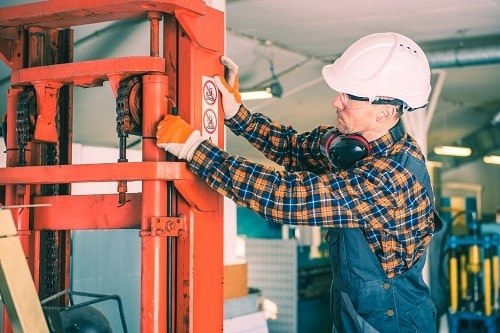Logistics managers are urged to seek total clarity in forklift safety examinations, after it was revealed that lift trucks are involved in 50 per cent more serious accidents than large good vehicles.
Features
The MOT for the forklift truck
Although forklift trucks are not subject to an MOT, as Heavy Goods Vehicles (HGV) are, they do require a Thorough Examination under both Lifting Operations and Lifting Equipment Regulations 1998 (LOLER) and Provision and Use of Work Equipment Regulations 1998 (PUWER) requirements, so the importance of carrying out this examination to the highest standard is critical to the industry and all those working in it.
The lack of clarity surrounding how often lift truck examinations are carried out and documented can leave managers confused – potentially placing employees at risk.
 Forklift trucks must be inspected to high standards. Photograph: iStock/peterscode
Forklift trucks must be inspected to high standards. Photograph: iStock/peterscode
At the recent National Fork Lift Safety Conference, HSE revealed there are around 1,300 serious forklift accidents each year – 50 per cent more than HGVs, therefore organisations need to ensure their lift trucks are inspected to a safe, rigorous standard satisfying both LOLER and PUWER requirements – and to treat the issue as seriously as inspecting vehicles on the road.
Every logistics or transport manager worth their salt knows exactly how their HGVs and public service vehicles (PSV) are inspected and maintained. But the truth is, your lift truck is far more likely to be involved in a lifechanging accident, and have its inspection regime questioned by HSE.
Ironically, satisfying the forklift Thorough Examination duties is far easier than for HGV inspections. Whereas HGVs need to undergo an annual MOT and formal programme of PUWER safety checks, the CFTS Thorough Examination for lift trucks covers LOLER and PUWER in one quality-assured process.
What’s more, if the Thorough Examination is carried out by an experienced lift truck specialist, you can have any faults fixed there and then – instead of waiting for a retest. For employers, that means fewer disruptions and lower maintenance costs.
The fact that HGVs are so well-inspected goes to show the benefit of absolute clarity around standards, schedules, methods and documentation, which is why BITA
and the FLTA, the forklift industry’s two leading authorities, teamed up to create CFTS in the first place.
Established in 2004, Consolidated Fork Truck Services (CFTS) is the forklift truck industry’s own voluntary standard for Thorough Examination. Accredited providers sign up to a code of conduct and standard inspection methodology, satisfying both LOLER and PUWER standards.
Its banner covers a programme of engineer and management training, plus the mechanism to monitor vehicle inspection standards. Companies accredited to the scheme – more than 400 in the UK – can be identified via the distinctive CFTS ‘kite’ certification mark.
So, it is about time that companies look into this easy way to examine the equipment and reduce the number of avoidable accidents involving forklift trucks.
More information on PUWER here
More information on LOLER here
More information on Thorough Examination here
Geoff Martin is Chairman of CFTS
FEATURES

Pursuing workplace wellbeing through authentic leadership
By Dr Audrey Fleming, British Safety Council on 26 April 2024
By being open, honest and vulnerable in their interactions at work – and genuinely seeking and valuing the input of employees – leaders can develop a workplace atmosphere where trust and respect flourish, in turn supporting the wellbeing, engagement and performance of their teams.

Out in the field: why lone worker monitoring is key
By Rebecca Pick, Pick Protection on 26 April 2024
People working away from a fixed base out in the field may need to quickly summon assistance in an emergency, but it’s important to choose the right communications and alarm technology for their needs.

Why line managers play a vital role in workplace wellbeing
By Marcus Herbert, British Safety Council on 03 September 2023
The behaviours of line managers can have a positive or negative impact on employee health, wellbeing and engagement, so it’s vital managers get staff feedback on whether their management style is supportive or negative, and have regular check-ins so workers can raise concerns about their wellbeing.



